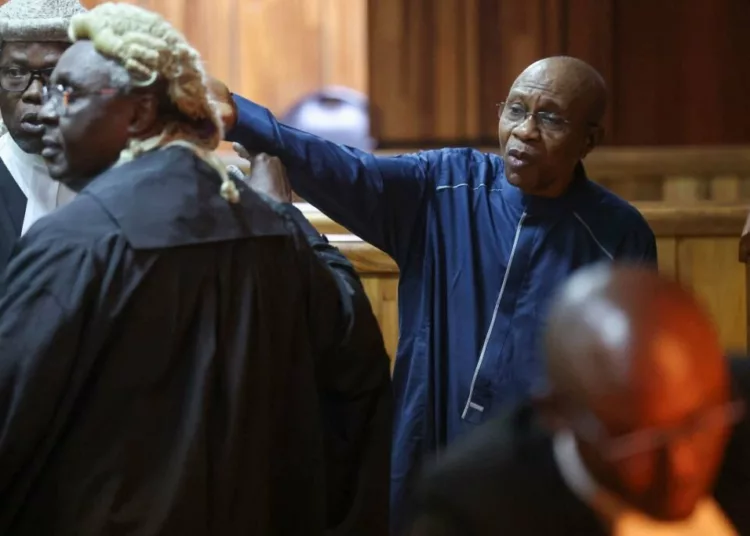Justice Rahman Oshodi of the Lagos State Special Offences Court in Ikeja yesterday dismissed an application filed by Godwin Emefiele, the former governor of the Central Bank of Nigeria (CBN), challenging the court’s jurisdiction to try him.
Justice Oshodi, while ruling on the application, held that the Economic and Financial Crimes Commission (EFCC) has established that the court has the territorial jurisdiction to determine counts eight to 20 on their merit.
The judge, however, struck out counts one to four on the ground that the offence described in those counts is unknown to law.
The former CBN boss was arraigned before the court by the EFCC alongside one Herry Omoile on allegations of accepting gratification, gifts through agents, corruption, and fraudulent property receipts.
The anti-graft agency also accused the defendant of conferring corrupt advantage on his associates contrary to the Corrupt Practices Act 2000.
The defendants, however, pleaded not guilty to the charge.
Emefiele has argued through his lawyer, Olalekan Ojo (SAN), that he cannot be tried in any state high court in Nigeria for alleged abuses of office, as this raises significant constitutional and legal issues.
The senior lawyer also maintained that the court does not have jurisdiction to try the offense of abuse of office related to the defendant’s position as governor of the Central Bank of Nigeria at the time of the alleged crimes.
However, in its opposition to the application, the anti-graft agency, through its lawyer, Rotimi Oyedepo (SAN), stated that the allegations against Emefiele are economic and financial crimes, which the EFCC is statutorily empowered to investigate and prosecute before the court.
Oyedepo also submitted that Lagos State is the proper venue for the defendants to be tried for the alleged offences, as all the ingredients of the alleged offences took place there.
In his ruling, Justice Oshodi held that while counts one to four pertain to the general offense of abuse of office as defined by criminal law, the specific actions alleged in these counts—namely, the allocation of foreign exchange without a bid—are not defined as an offense in any written law. As a result, the court struck out these charges.
But on counts eight to twenty-six, the judge held that, by applying established legal principles, the evidence presented was sufficient to affirm the court’s territorial jurisdiction.
He pointed out that his decision is strictly limited to the jurisdictional objection and does not speak to the merits of the allegations against Emefiele.
Justice Rahman Oshodi subsequently ruled that the objection challenging the court’s territorial jurisdiction over counts eight to twenty-six failed and was thus dismissed.
The matter was later adjourned until February 24 and 26 to continue the trial.
Leadership












